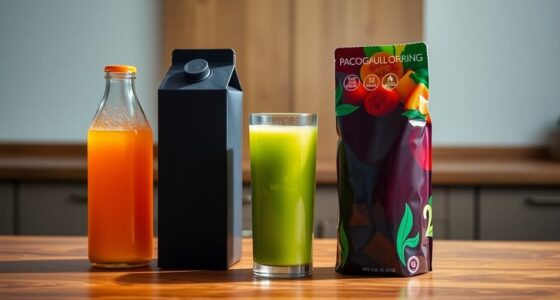If you drink apple juice to relieve constipation, you can expect it to work within 30 to 60 minutes. Some people might even feel relief in just 15 minutes due to its natural laxative properties from sorbitol. A daily serving of about four ounces is generally recommended for effective results. Remember, everyone's body reacts differently, so it's good to pay attention to your own response. There's more to discover about apple juice and its benefits for digestion!
Key Takeaways
- Apple juice typically takes 30-60 minutes to induce a bowel movement after consumption, with some individuals experiencing effects in as little as 15 minutes.
- A daily serving of four ounces (120 mL) of 100% apple juice is recommended for effective hydration and stool softening.
- The natural laxative properties of apple juice come from sorbitol and sugars that help draw water into the colon.
- Individual responses to apple juice can vary significantly, affecting the timing of relief.
- If no bowel movement occurs after one hour, consider other fluids or activities for constipation relief.
Understanding Constipation and Its Symptoms
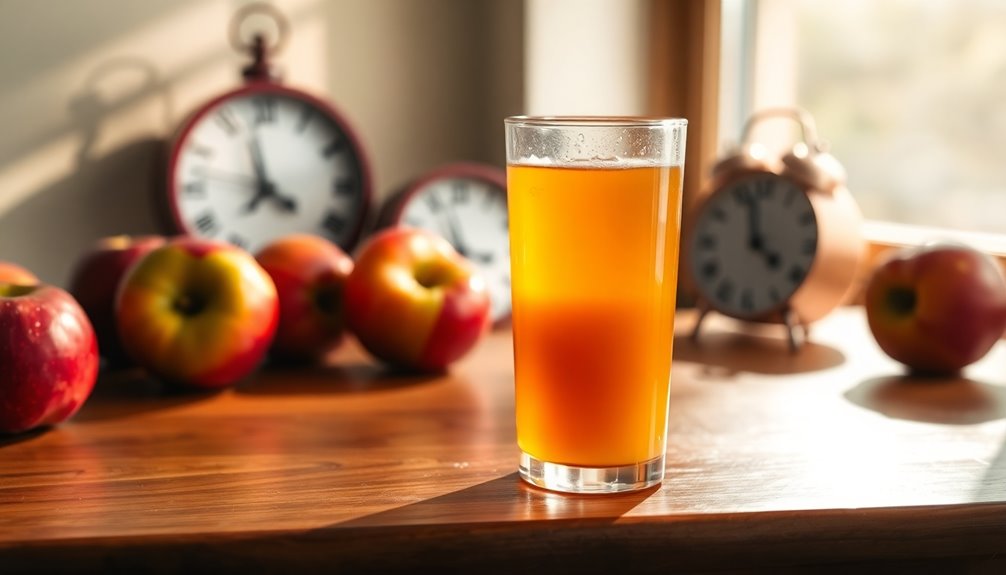
When you're dealing with constipation, it's important to recognize its symptoms early on. Typically, constipation is marked by fewer than three bowel movements a week, resulting in hard and dry stools that can be painful to pass.
You might notice straining during these bowel movements or feel blocked, unable to fully empty your bowels. Emotional factors, like stress from routine changes, can also contribute to constipation, especially in children.
To support your digestive system, focus on increasing your intake of high-fiber foods, which can help soften your stool.
The Role of Apple Juice in Relieving Constipation
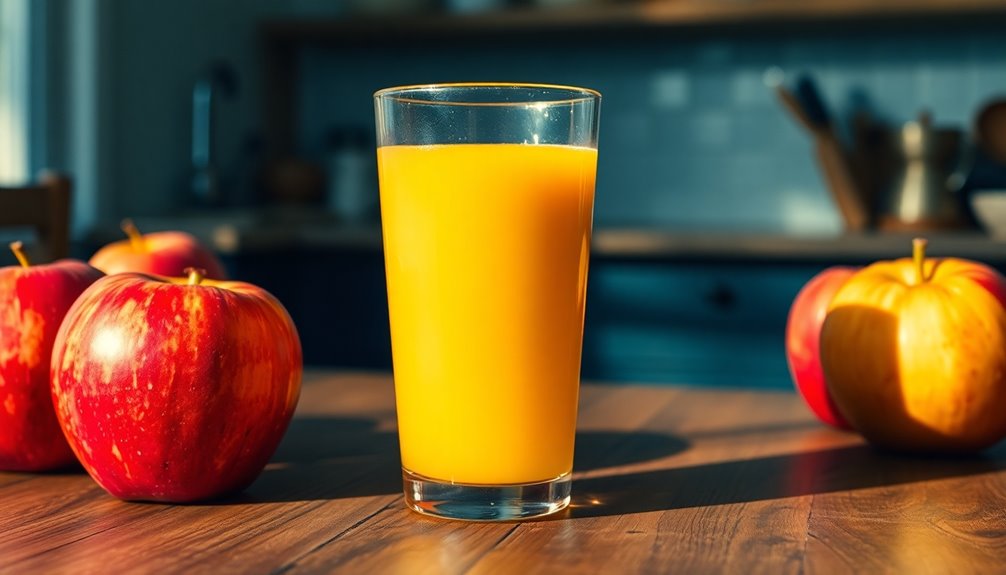
Apple juice can be a helpful aid if you're dealing with constipation.
Its natural laxative properties come from sorbitol and a good balance of sugars, which can help soften stools and promote bowel movements.
Let's explore how to incorporate apple juice into your diet effectively for better digestive health.
Laxative Properties Explained
If you're looking for a natural way to relieve constipation, apple juice might just do the trick. Its high sorbitol content acts as a sugar alcohol that stimulates bowel movements by drawing water into the colon, mixing with stool.
The high fructose-to-glucose ratio enhances its laxative effect, making it easier for hard stools to pass. Plus, drinking apple juice boosts your fluid intake, essential for softening stools and supporting your digestive tract.
While a cup provides about 0.5 grams of dietary fiber—less than a whole apple—it still contributes to digestive regularity. Moreover, incorporating meal replacement juices into your diet can further support digestive health and promote regularity.
Keep in mind, individual responses vary; some may notice results in as little as 15 minutes, while others might take up to an hour to experience relief.
Recommended Consumption Guidelines
For those seeking relief from constipation, understanding the right amount of apple juice to consume can make a difference.
The recommended consumption guidelines suggest a daily serving of four ounces (120 mL) of 100% apple juice. This amount provides proper hydration and can help soften stools. The high fructose-to-glucose ratio in apple juice works well to loosen hard stools, with effects often seen within 30-60 minutes.
However, it's important to remember moderation, especially for children. Limiting intake to four ounces daily prevents excessive sugar consumption and avoids potential gastrointestinal distress.
While apple juice can aid in prevention, whole apples are generally better due to their higher fiber content, offering more effective bowel regularity.
Key Ingredients in Apple Juice That Aid Digestion
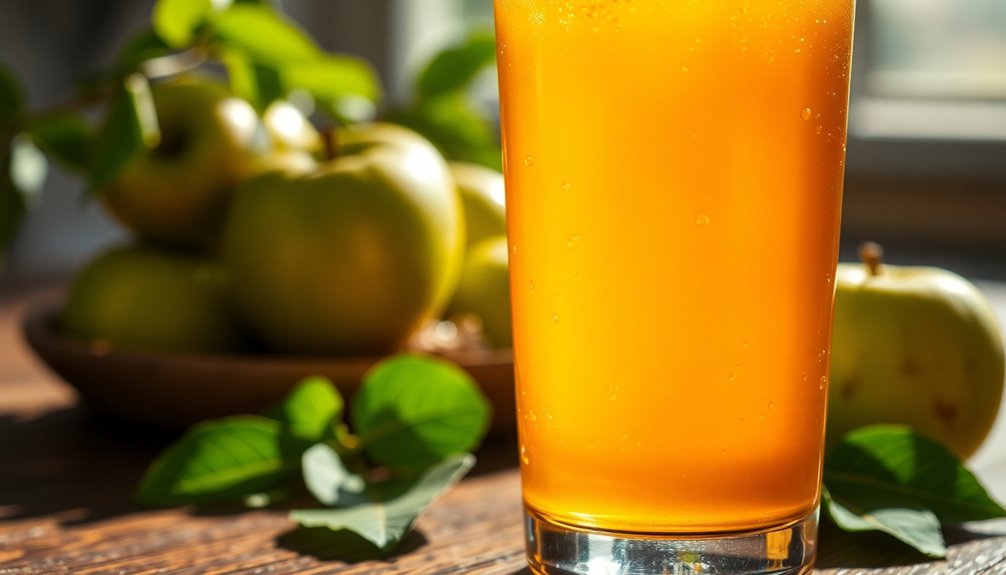
When you drink apple juice, you're getting key ingredients that support your digestion. Sorbitol acts as a natural laxative, while the fructose helps break down hard stools. Plus, the fiber in apple juice adds an extra boost for your digestive health. Additionally, turmeric's anti-inflammatory properties can complement digestive health by reducing inflammation in the gut.
Sorbitol's Laxative Effect
Sorbitol, a natural sugar alcohol found in apple juice, plays an essential role in easing digestion and alleviating constipation. This non-digestible sugar pulls water into your colon, enhancing stool passage and often triggering bowel movements within 30-60 minutes.
If you opt for apple cider, you'll enjoy an even stronger laxative effect, as it contains about 20% more sorbitol than regular apple juice. The higher fructose-to-glucose ratio in apple juice also helps loosen hard stools, promoting regularity.
Additionally, vitamin C contributes by drawing water into the intestines, further supporting your digestive health. While small amounts of apple juice can provide effective relief for mild constipation, remember that individual responses to sorbitol may vary. Furthermore, regular consumption of fiber-rich foods can complement the effects of heat pump efficiency in maintaining overall digestive health.
Fructose and Digestion
Because apple juice contains a high fructose-to-glucose ratio, it can be particularly effective in promoting digestion.
Fructose, a simple sugar in apple juice, contributes to its laxative effect by drawing water into your intestines. This increased water content helps soften hard stools, making it easier for you to have bowel movements.
On average, a cup of apple juice has about 14 grams of fructose, which can stimulate digestion and alleviate constipation for many.
However, individual responses to fructose can vary. Some people might experience discomfort due to sensitivity to fermentable sugars, including those found in apple juice.
Fiber's Role in Relief
Although apple juice isn't as fiber-rich as whole apples, it still plays a role in supporting digestive health.
Apple juice contains about 0.5 grams of dietary fiber per cup, which can aid digestion, though it's less than the 2.4 grams found in whole apples. Drinking juice can help loosen hard stools thanks to its higher fructose-to-glucose ratio, enhancing its laxative effect.
Additionally, sorbitol in apple juice pulls water into the colon, making stool passage easier and typically triggering a bowel movement within 30-60 minutes. Regular check-ups are also essential for monitoring overall digestive health.
While it's not a substitute for whole apples, the fiber's role in relief and the other beneficial components can promote regular bowel movements and overall digestive comfort.
How Long Does It Take for Apple Juice to Work?
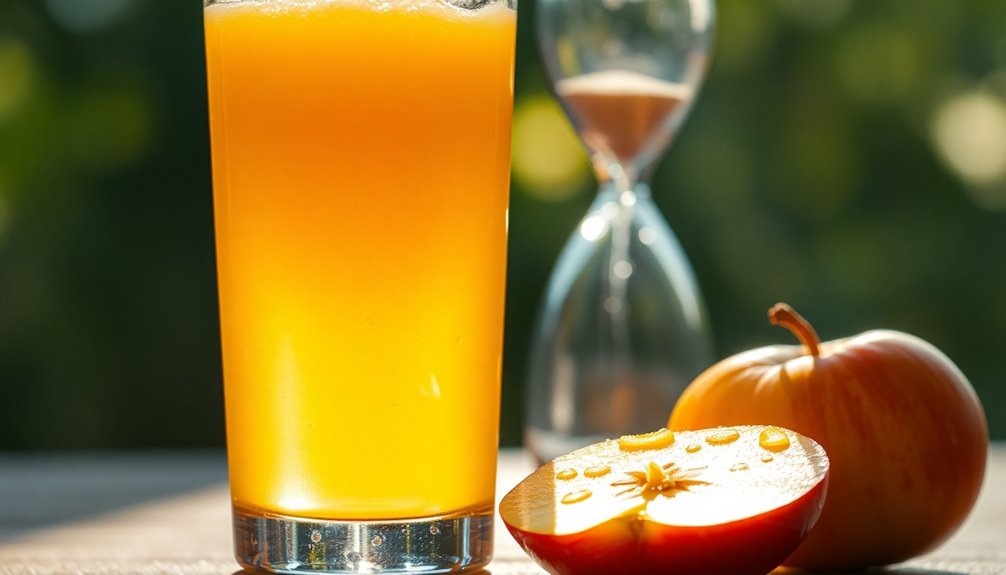
When you drink apple juice, you might notice it starts to work fairly quickly, often triggering bowel movements within 30 to 60 minutes. This is mainly due to its high fructose and sorbitol content, which helps alleviate constipation. Some people even report relief in as little as 15 minutes. However, not everyone will experience the same results. If you don't see any bowel movement after an hour, consider trying other fluids or physical activity to stimulate digestion. Regular consumption of apple juice, about four ounces daily, can also help maintain bowel regularity.
| Time to Effect | Notes |
|---|---|
| 15 minutes | Some individuals feel relief |
| 30-60 minutes | Typical onset for most |
| 1 hour | Consider alternatives if no action |
| Daily intake | Helps maintain regularity |
| Varies | Results can differ per person |
Recommended Dosage of Apple Juice for Constipation Relief

To effectively relieve constipation, it's recommended that you provide about four ounces (120 mL) of apple juice daily for children. This amount can help stimulate bowel movements due to the juice's sorbitol content and its mild laxative effect.
While apple juice contains roughly 0.5 grams of dietary fiber per cup, it's worth noting that whole apples are more effective for digestive health because they offer higher fiber content.
For children with chronic constipation, this recommended dosage of apple juice can be beneficial, but always consult a pediatrician for personalized guidelines.
Comparing Whole Apples and Applesauce for Digestive Health
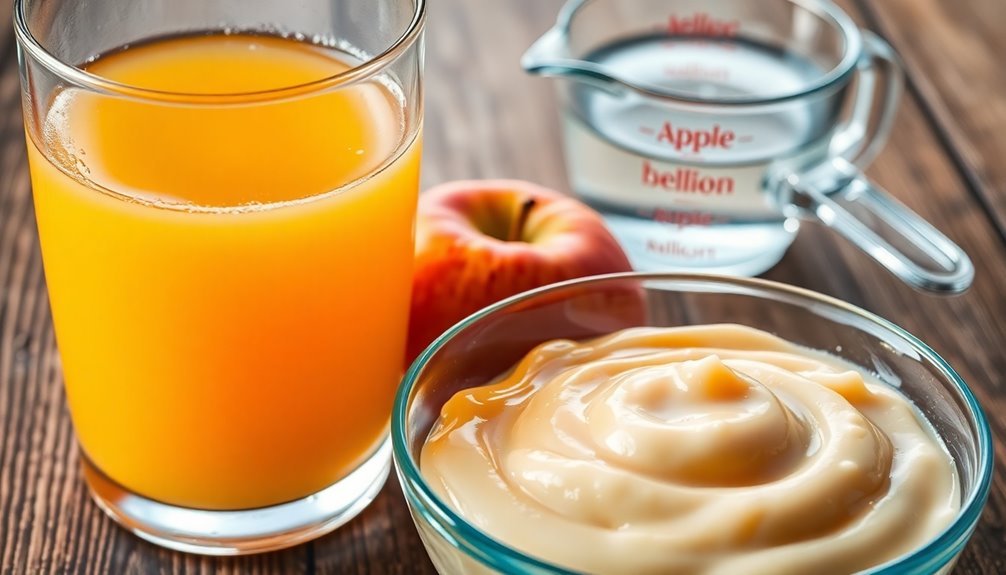
While both whole apples and applesauce are popular choices for promoting digestive health, they differ greatly in their fiber content and overall effectiveness.
Whole apples offer about 2.4 grams of dietary fiber per fruit, noticeably more than the 0.5 grams found in a cup of applesauce. This fiber, especially in the skin, adds bulk to stool, aiding bowel movements and alleviating constipation. Whole apples also contain sorbitol, which helps draw water into the intestines, enhancing digestion. Additionally, the antioxidants in whole apples can contribute to overall gut health by combating oxidative stress.
In contrast, applesauce's lower fiber and sorbitol content may limit its benefits for gut health.
- Whole apples boost dietary fiber intake.
- Sorbitol in apples aids digestion.
- Apples enhance gastrointestinal motility.
- Applesauce is easier to digest but less effective.
Who Should Consider Drinking Apple Juice?
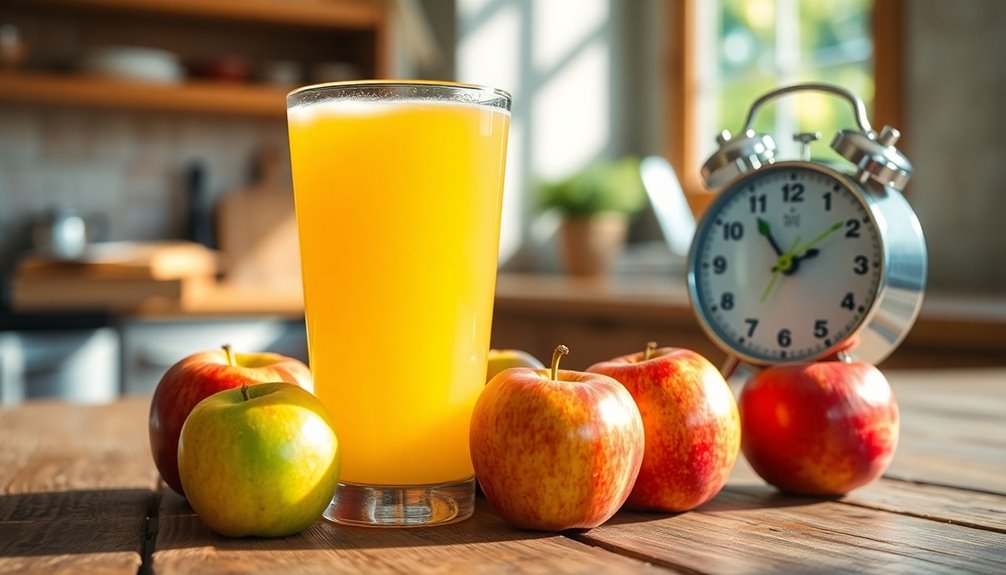
If you're dealing with mild constipation or looking for a gentle way to increase fluid intake, consider drinking apple juice. A small four-ounce glass daily can help promote bowel movements by leveraging its high fructose-to-glucose ratio and the presence of sorbitol. This can be especially beneficial for children who might be reluctant to drink water, as it offers a tasty alternative to relieve occasional constipation. Additionally, apple juice contains high fructose content, which can further support digestive health. However, if you have gastrointestinal disorders or sensitivity to FODMAPs, it's wise to consult with a healthcare professional before consuming juice, as it may cause discomfort.
Alternatives to Apple Juice for Constipation Relief

- Pear juice: High in sorbitol, it acts as a mild laxative.
- Prune juice: Known for its effectiveness, it's loaded with fiber and sorbitol to soften stools.
- 100% orange juice: While lower in sorbitol, it still provides hydration and can help maintain regularity.
- Coconut water: Although it doesn't have direct laxative effects, it offers hydration and electrolytes that support bowel health.
Incorporating these fruit juices and whole fruits like pears or prunes into your diet can enhance fiber intake and promote constipation relief. Additionally, consuming butter's nutritional aspects may also support digestive health when included in a balanced diet.
When to Seek Medical Advice for Constipation Issues

How do you know when it's time to seek medical advice for constipation issues?
If you or your child haven't had a bowel movement in more than five days or if constipation symptoms persist despite home remedies like increased juice consumption, it's essential to contact your doctor.
For adults, if you're having less than three bowel movements per week, that's a sign to seek medical advice.
Additionally, watch for signs of rectal tears, such as severe pain or blood in the stool, which may indicate a serious condition.
Don't hesitate to reach out to a healthcare professional if discomfort is noticeable, especially in children experiencing severe pain during bowel movements.
Your health is important, so stay proactive!
Frequently Asked Questions
How Long Does It Take Apple Juice to Make You Poop?
When you drink apple juice, you might notice it can prompt a bowel movement within 30 to 60 minutes.
Some people even report needing to go as soon as 15 minutes after drinking it. This quick response often relates to the high sorbitol and fructose levels in the juice. The presence of these sugars can stimulate bowel movements in some individuals, leading to discomfort or urgency shortly after consumption. Additionally, it’s important to consider factors such as personal tolerance levels and how different juices interact with the digestive system. For those curious about how to store this beverage for optimal freshness, the topic of pineapple juice shelf life explained can provide valuable insights into its longevity and best practices for preservation.
If you don't feel the urge after an hour, consider trying other fluids or moving around a bit to help stimulate digestion.
What Simple Trick Empties Your Bowels Immediately?
If you're looking for a simple trick to empty your bowels quickly, try drinking a glass of warm water with lemon.
The acidity of lemon juice can stimulate your digestive system, helping to move things along.
You can also consider increasing your fiber intake or engaging in light physical activity, like walking, to encourage bowel movements.
Does Apple Juice Act as a Laxative?
Yes, apple juice can act as a mild laxative for some people.
Its sorbitol content helps pull water into your colon, making it easier to pass stool. You might notice effects within 30 to 60 minutes after drinking it, though individual responses vary.
The higher fructose levels in apple juice also help loosen hard stools.
What Is the Quickest Drink for Constipation?
Imagine your digestive system as a garden, waiting for rain to flourish.
When you're looking for the quickest drink for constipation, prune juice is your best watering can. Its high sorbitol and fiber content work like a gardener's tools, swiftly breaking up stubborn soil.
Four ounces of this nectar can bring relief within hours. While apple juice helps too, prune juice often reigns supreme, so keep it handy for those dry spells!
Conclusion
While you might think relying solely on apple juice for constipation relief isn't enough, it can actually be a helpful addition to your diet. By incorporating apple juice, you're not just getting hydration; you're also benefiting from its natural sugars and fiber that support digestion. Just remember, balance is key—pairing it with whole fruits and plenty of water can enhance its effects. So, give apple juice a try and see how it works for you!
Cindy thoroughly researches juicing trends, techniques, and recipes to provide readers with practical advice and inspiration. Her writing style is accessible, engaging, and designed to make complex concepts easy to understand. Cindy’s dedication to promoting the advantages of juicing shines through her work, empowering readers to make positive changes in their lives through the simple act of juicing.




